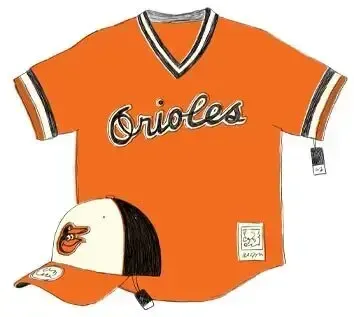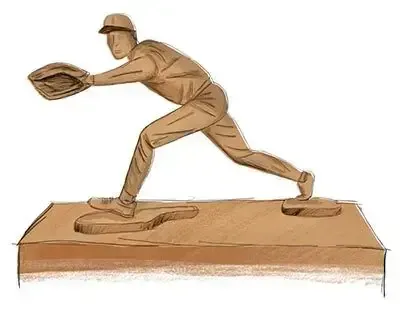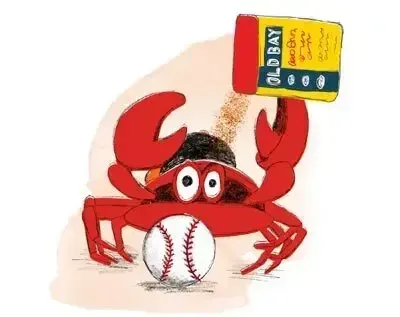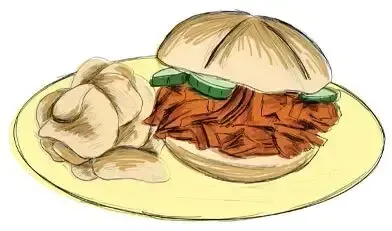- October 03, 2023
- By Annie Krakower
Restaurants featuring everything from street tacos to dumplings to lobster rolls. Roof decks and lounges, clothing shops, art exhibitions and a playground for the kids. Oh yeah, and there’s a runner on first with nobody out.
We all know that fan (some of us are that fan) who goes to a ballgame and takes in everything but what’s actually happening on the field. That’s possible thanks to what kinesiology Lecturer Michael Friedman M.A. ’04, Ph.D. ’08 calls the rise of the “mallpark,” a triple-header of a facility that’s equal parts game venue, shopping mall and theme park. He writes about the phenomenon in his new book, “Mallparks: Baseball Stadiums and the Culture of Consumption,” published in July by Cornell University Press.
“The diehard fan is going to be into the game, but if the diehard fan is your only consumer, you’re gonna go broke,” he says. “So the question is, ‘What is the experience you’re offering attendees beyond the game?’”
Having grown up in Potomac, Md., Friedman recalls parking bumper-to-bumper at the old Memorial Stadium to watch the Baltimore Orioles. When he was 13, his dad took him on a road trip to catch games at 20 other MLB stadiums. His grandfather, who helped develop Wheaton Plaza and Tysons Corner Center; a stepfather, who cofounded the retail chain Service Merchandise; and a stepbrother, an executive at Disney World, also exposed him to the intricacies of shopping malls and theme parks.
Those experiences informed his research for “Mallparks,” as did stadium tours, trips to the National Baseball Hall of Fame Library and interviews with project managers, mayors and more. His book observes that starting in the 1980s, as deindustrialization increased and downtowns declined, people wanted more novelty and excitement out of their cities.
Terps can find Baltimore’s sporty solution with a quick trip up I-95 to Oriole Park at Camden Yards, “the quintessential mallpark,” Friedman writes in his book. Opened in 1992, the stadium combines baseball with the city’s aesthetic and historical contexts, giving it the feel of an old-fashioned ballpark with modern amenities—“an act of historic nostalgia,” wrote columnist George Will. Mallparks either built or renovated since, like Fenway Park and Dodger Stadium, have used Camden Yards as a model.
The key is “giving (fans) the sights and the smells and the sounds and the tastes that will engage them at a lot of levels,” Friedman says.
Take a trot around the bases as he explains how the O’s park does just that.
BALTIMORE AND OHIO WAREHOUSE ON EUTAW STREET
The
eight-story, 1,000-foot-long nod to the city’s industrial past now
houses Orioles offices and cements the park’s old-time Baltimore theme.

TEAM SHOP(S)
“The American pastime is not
baseball. It’s shopping,” Friedman says. “We want to remember our
experiences by having stuff.” Camden Yards delivers with the official
team store in the warehouse and seven other merchandise stands
throughout the park.

STATUES OF BALTIMORE GREATS
Bronze sculptures of
Cal Ripken Jr., Jim Palmer, Eddie Murray, Earl Weaver, Brooks Robinson
and Frank Robinson make it so that “from that time you walk in,
everything around you is baseball,” Friedman says. A likeness of Babe
Ruth, a Baltimore native, joins the O’s legends.

CRAB SHUFFLE
Between innings—in addition to the
popular ketchup, mustard and relish hot dog race—viewers can play a
shell game on the Jumbotron, as they try to track which of three
animated, Old Bay-covered crabs quickly switching positions has a
baseball hidden under it. The schtick is typical of mallparks’ efforts
to “really tie into the cities that are around them,” Friedman says.

BOOG’S BBQ
The four-time All-Star and former
MVP’s restaurant serves up pit beef, pork sandwiches, Old Bay chips and
nostalgia. “If you’re there on the right day, Boog Powell is out there
shaking your hand and taking selfies,” Friedman says.
This story is featured in the Fall 2023 issue of Terp magazine. Find all the stories online at terp.umd.edu.
Topics
ResearchUnits
School of Public Health